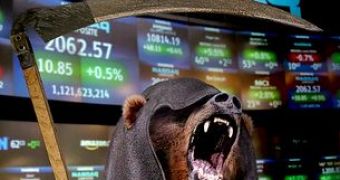The way that stock markets seem to react to crisis is just like plants and animals do, a new major study that could one day predict future financial events, suggests.
The research was carried out by a team of academics led by Alexander Gorban, a Professor of Applied Mathematics at the University of Leicester, and including Tatiana Tyukina from the University of Leicester and Professor Elena Smirnova from the Siberian Federal University, Russia.
They have called this theory the 'Anna Karenina Principle', after Leo Tolstoy’s tumultuous novel whose opening phrase is “happy families are all alike; every unhappy family is unhappy in its own way.”
Choosing this phrase and the title that comes with it, seemed appropriate to Professor Gorban because he believes that plants, people and stock markets work mainly the same, until things go wrong, and they start to react differently.
He adds that knowing how a system faces stress and becomes more independent and less stable, gives certain patterns that can predict the next crisis and its result – whether it's death or recovery.
Apparently, when a crisis approaches, systems tend to be closer to each other, but even if they depend more on one another, they are also more likely to react differently.
A plant example to sustain this statement is the result of a Scots pine trees study near a power station, which had the overall structure of the needles similar to those outside the polluted area, but a very high contrast and mutuality of individual components.
As for the human example, the team looked at human physiology, at the way healthy people adapted to a change in climate conditions and at the clinical signs accompanying fatal outcomes in cancer and cardiology clinics.
So the researchers could only conclude that systems under stress show similar symptoms, whether we are talking about polluted forests, cancer patients or the FTSE 100, AlphaGalileo reports.
Gorban says that this parallel between the way that humans, animals and plants adapt to harsh living conditions and the behavior under stress of stock market prices and the banking sector is rather weird but it allows the detection of early signs.
The research adds that stocks and shares had a similar pattern during the financial crisis of mid 2008: stocks became more interdependent and volatile as the FTSE100 went down, but by the end of the year the system became less connected and even more unstable, which only meant that the financial systems did not adapt to the changed circumstances of the market, and a crash was imminent.
The research was published in the journal Physica A.

 14 DAY TRIAL //
14 DAY TRIAL //